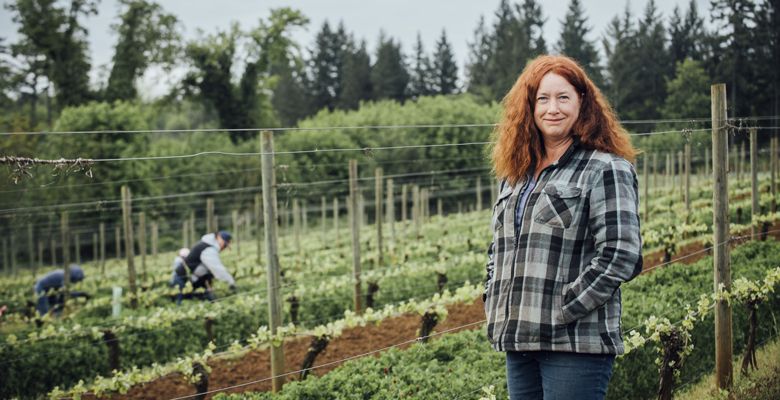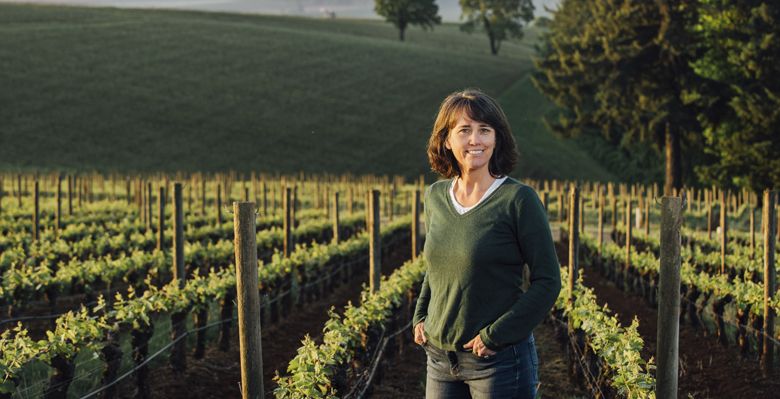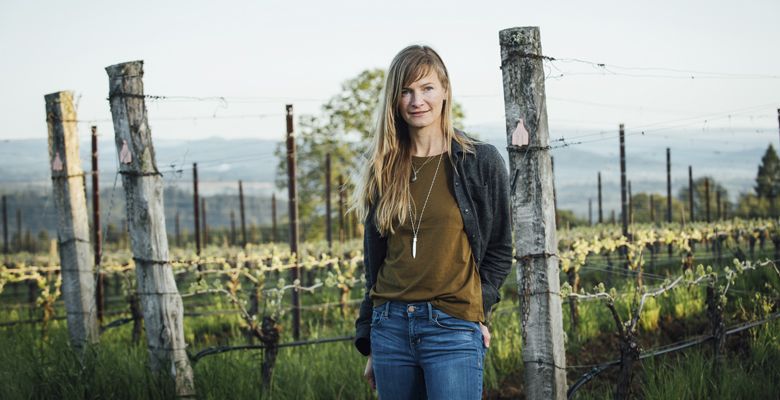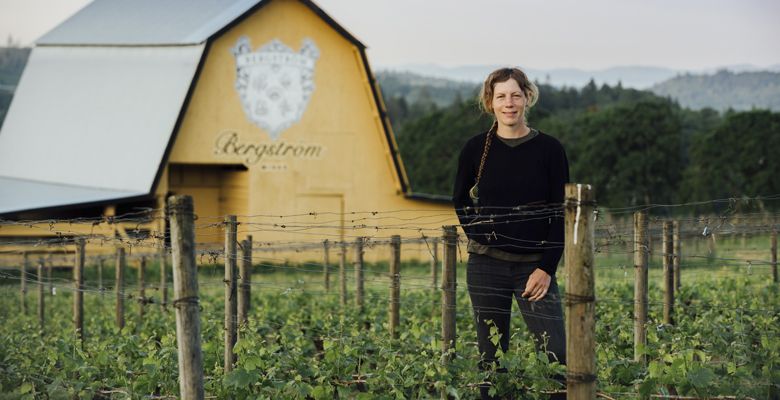Outstanding in Her Field
Meet the women turning male-dominated vineyard management on its heels
Story by Tamara Belgard • Photos by Kathryn Elsesser
Actually, some women want to drive tractors. While women have broken through barriers once keeping them out of the winemaker spotlight, vineyard management is still mostly dominated by men. Here in Oregon — perhaps more than any other wine region — women are changing the status quo. Small in number only, these forthright leaders are turning on its heel the notion that managing vineyards is a man’s job.
Jessica Cortell, owner of Vitis Terra Vineyard Services, is no stranger to decidedly male environments. At 18, she fought forest fires to pay for college; she’s also raced mountain and road bikes among top competitors. Yet she’s always been a plant person. She studied chemistry for her doctorate before realizing her preference to work outside, not in a lab. Early in her career, while working with Dai Crisp in the ’90s at Croft Vineyard, she helped prune vines, a task not routinely assigned to women at the time. She recalls being the fastest and finest on the crew, earning respect from her male peers.
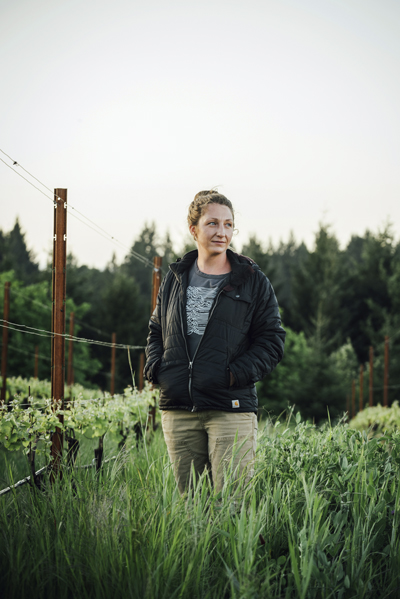
Cortell says her work ethic developed at age 12, when she was employed at a nursery. She was impressed with hard-working Latino laborers, who always maintained positive attitudes, while she struggled simply to keep up. After earning her bachelor’s and master’s in horticulture at Oregon State University, she worked at Croft. She also applied for a vineyard manager job but was not asked to interview. She remembers, “I was in a conversation with some people in the industry — they did not know I’d applied for that job — and someone said, ‘Two qualified women applied, but they were not given interviews because women can’t manage Latino crews.’ I didn’t say anything, but took note.”
Netanya Welch knew she belonged in the wine industry, but as a winemaker. She’d planned to attend UC Davis to study enology, but instead accepted an internship in St. Helena, California, at Cain Winery, where she discovered her passion for vineyards, not the cellar. Inspired by Cain’s vineyard manager, Ashley Anderson, Welch began pursuing studies in viticulture at Chemeketa College; she’s now the director of viticulture for Mark Tarlov’s Rose & Arrow Estate.
Welch admits most of the misogyny actually arises from older, well-established farmers who can’t believe a woman drives tractors and trailers. She adds, “But you get through those hurdles. It just takes being confident and consistent.” As for her crew, she’s had only positive experiences. Her recipe for success includes earning their respect by working as hard or harder, and being kind yet firm. “I’d rather lead them out of respect and love, than fear.”
Leti Catoira-Rice, vineyard manager for Jackson Family Wines, and overseer of 450 acres, follows a similar philosophy. “I trust my employees,” she says. “We have good communication and a respectful work environment, so there’s no need for me to be controlling or authoritarian, or for them to challenge me or my decisions.”
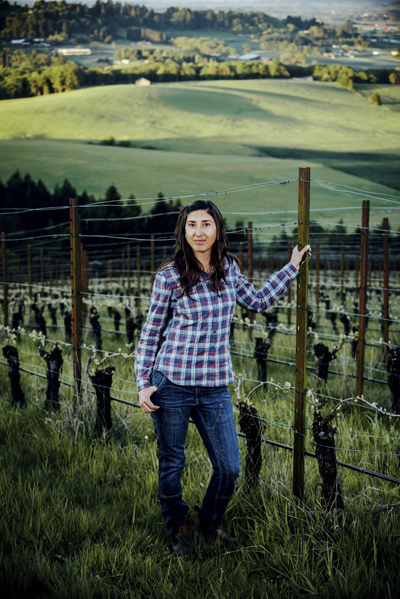
Since she speaks Spanish fluently and the majority of employees are from Mexico, there’s no language barrier, which helps immensely when leading her group. Catoira-Rice adds, “Equally as important is that I have a great respect for all the members of my team and what they do. I really appreciate their hard work every day, and I value their knowledge and experience. I think every one of them plays an essential role to achieve the exceptional quality we expect from our vineyards.”
At Erratic Oaks Vineyard, Lisa Zuniga manages 202 acres with a primarily all-female crew. She landed the job with no experience and zero formal education. Though she grew up in Salem, with numerous vineyards practically in her backyard, it wasn’t until a random trip to Temecula, California, in the 1990s — there were only a handful of wineries in that area at the time — that she discovered her calling. She describes the moment she stepped into the vineyard and felt the energy of the land. She remembers thinking, “I have to do this.”
Zuniga began her career at Firesteed in 2004, in the tasting room. After a year and a half, she moved into winemaking for 12 years while working concurrently in the vineyard. One day, she went into the winemaker’s office and offered to work more in the vineyard. She soon found herself trying to lead an all-male crew who didn’t want to listen to her.
Along with her field boss, Reina “Queenie” Saavedra, she began talking to the women doing what was called “women’s work” — thinning, tying down, dropping fruit — and invited them to prune. She says, “It’s become normal for them; now, they don’t think twice about it, but at first, they weren’t comfortable saying they were pruning.” Zuniga says her workers feel empowered by performing such tasks, and they earn more, too.
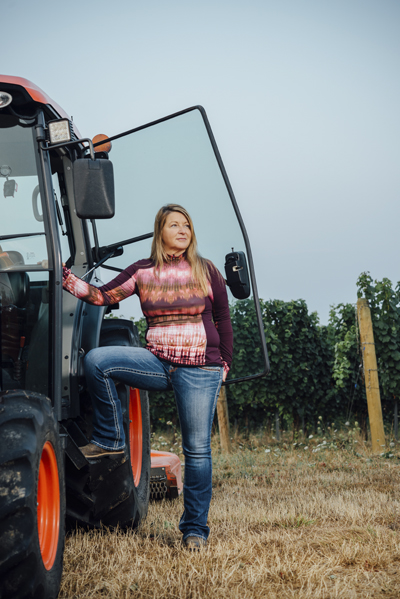
It didn’t take long for men to stop approaching her for work. Though there may be some resentment from the initial crew who left when Zuniga first started managing, she has no problems with the male seasonal workers. She says “The guys who work harvest love working with the ladies. They get fed, they get taken care of, and they like knowing I’m their boss.”
Cortell, similarly, does not separate tasks into woman’s work and men’s work. Her desire is placing people into jobs where they can excel.
This group of women, which also includes the legendary Leigh Bartholomew of Results Partners, as well as newer managers like Lauren Eisold of Atlas Vineyard Management, Sara Martin of Bergström Wines, Kelli Gregory of Adelsheim Vineyard and Nadine Lew Basile of Soter Vineyards, created a tight-knit community. They gather often to exchange ideas or troubleshoot problems. Welch says, “Having other women vineyard managers as mentors for advice is wonderful.”
When these remarkable women describe their greatest work challenges, no one mentions feeling weak, about limitations or being a woman in a man’s field. Zuniga says her body never feels incapable. “The physical demands are part of what I love — you walk a lot, lift a lot; it makes you strong. [My work] has taught me not to be afraid to manhandle things — if it doesn’t want to go on, kick it. Read a manual; watch a video. Just don’t be afraid to tackle it. You can’t be frightened in this job; you have to take risks and you have to push.”
Other issues make vineyard work challenging for both sexes. Cortell says, “Work-life balance doesn’t exist for us. Some have achieved it, but during the growing season, they easily work 14 hours a day, six days a week. But if you really like what you do, you don’t really think about it.”

She continues, “Vines are easy; it’s the people that are hard. Managing labor, managing people is really hard. [Not to mention], clients have their idiosyncrasies, very specific needs and wants. Keeping good people, keeping good people happy, managing drama, that’s the challenge.”
Regardless of gender, many managers are witnessing the writing on the wall: Increasingly more people don’t want to do the work anymore. Zuniga explains, “We used to have kids coming in, but nobody’s kids want to do it anymore. They look at vineyard work as just hard farm work that’s very labor intensive. The parents who are working in the vines now want their kids going to school instead.” The expansion of mechanizing the work is also adding to the “people” problem.
Welch concurs that staffing remains her biggest challenge, but she feels optimistic. “I strongly encourage more young women to get into this industry and be fearless. There’s a wonderful community of supportive people who can advise or help.”
In a growing industry, with new vineyards planted every day, and vineyard managers imported from other states, there exist multiple opportunities. Welch says, “You’ll never be bored.”


